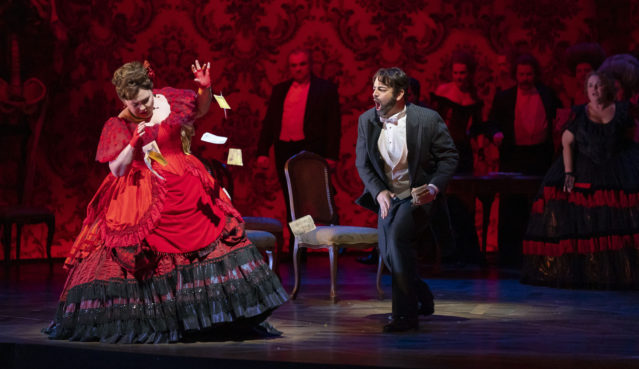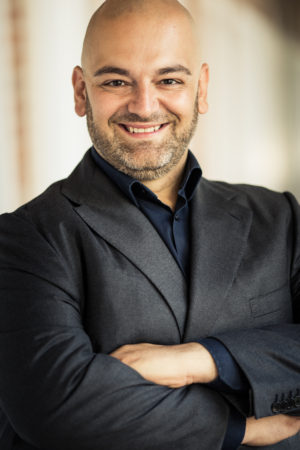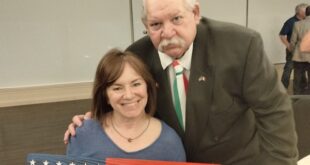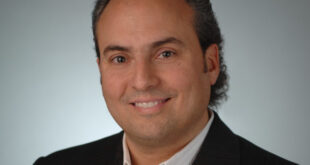
Giorgio Berrugi was making a name for himself as a concert clarinetist until an impromptu serenade sent him on a completely different career trajectory.
Giorgio Berrugi’s unlikely career as one of opera’s most electrifying upstarts is proof that second acts aren’t just for the stage.
The 41-year-old tenor, whose voice has been celebrated by opera critics and fans for its bright and full-bodied Italian sound, has ascended into rarefied air in little more than a decade. Berrugi has performed for some of opera’s most esteemed houses — including the Royal Opera House in London, Lincoln Center in New York City and Teatro alla Scala in Milan — in leading roles penned by Mozart, Verdi, Puccini and Donizetti, to name a few.
It’s a grand feat for any singer, made even more impressive given that Berrugi didn’t begin formal training until he was 30 years old — a rare late start by industry standards. Born in Pisa, Italy, Berrugi was classically trained as a clarinetist with a burgeoning career as both a soloist and chamber musician, holding the prestigious first clarinet position in the Orchestra Sinfonica di Roma. But thanks to a few bars sung aloud on a lark during an orchestra rehearsal in 2007, his entire life changed.
“It’s a funny story,” Berrugi told Fra Noi in an exclusive interview. “We were playing ‘Traviata’ in Rome with an amazing cast, including Angela Gheorghiu and Ambrogio Maestri. At a break, I started singing as a joke between colleagues and the singers heard me. They started asking questions, and they convinced me to see a renowned singing teacher. I went to the appointment and [the instructor] told me, ‘You’re too old and I have no time to waste. I’ll give you five minutes.’ I sang one aria and he said, ‘You can burn your clarinet!’”
Fortunately, Berrugi didn’t set his beloved clarinet ablaze. In fact, he still reaches for it from time to time, mostly to play with his 7-year-old son, Lorenzo, who accompanies him on piano. “Lorenzo says my voice hurts his ears, so when we play together, I must play the clarinet, or sometimes the saxophone,” Berrugi jokes.
Berrugi began his formal operatic training with private lessons from legendary La Scala baritone Carlo Meliciani, and it wasn’t long before he was stepping onstage to make his professional debut as Rodolfo in “La bohème.” The lovelorn poet at the center of Puccini’s masterpiece is one of the most iconic tenor roles in all of opera, and it’s the role Berrugi has returned to most often, playing him in a dozen productions, including the 120th anniversary staging at Teatro Regio in Turin.
 Berrugi spent the first few years of his career as a member of the ensemble at Germany’s Semperoper Dresden opera house, digging into characters such as Don José in “Carmen,” the Duke in “Rigoletto,” and Gennarino in the world premiere of Hans Werner Henze’s “Gisela.”
Berrugi spent the first few years of his career as a member of the ensemble at Germany’s Semperoper Dresden opera house, digging into characters such as Don José in “Carmen,” the Duke in “Rigoletto,” and Gennarino in the world premiere of Hans Werner Henze’s “Gisela.”
He most recently debuted as Alfredo in the revival of “La traviata” at the Lyric Opera of Chicago in February to rave reviews, with the Chicago Sun-Times critic hailing him as “a very special tenor.” Despite the magic Berrugi and company created on stage, the production had a number of personnel changes due to illness. Berrugi’s costar, Albina Shagimuratova, came down with acute laryngitis, parting the curtain to allow her understudy, Emily Birsan, to step in for several performances, but the tenor says he and the cast never skipped a beat.
“Emily is such a great singer and a real artist,” Berrugi says. “I had nothing but a great experience singing with her for three performances. She sings not from the ego, but by feeling the truth of her character. Plus, she knew the staging perfectly, so there was nothing to adjust!”
While in Chicago, Berrugi managed to take in a few sights — including the Art Institute and a Bulls basketball game — while protecting his vocal instrument from the city’s harsh cold. “Singers must pay attention to their voice like monks to the scriptures!” he proclaims. Although Berrugi takes great pains to care for his voice and body, even he eventually fell victim to the Midwest’s brutal cold and flu season, fighting through sickness at several Lyric performances.
“You do all you can,” Berrugi says. “You eat strictly, no alcohol, you exercise every day, you stay in the hotel most of the time and you disinfect your hands. But when it comes, you cannot do anything about it,” he says. “In the past, I have performed with high fever, laryngitis and even a broken ankle. Adrenaline is a great supporter, and if your voice is OK, you try to sing no matter what. But it’s not simple, and many times after the show you have to pay double the price.”
This unwavering commitment to his craft has earned Berrugi legions of fans around the world, including operatic legend Placido Domingo. Berrugi has shared the stage with Domingo in the past, and the esteemed tenor named Berrugi one of his heirs in a recent interview. This seismic endorsement — and all it entails — isn’t lost on Berrugi. In the end, however, he’s happy just being himself.
“It’s a great honor,” Berrugi says. “I was so lucky to perform with him, one of my idols. But I must admit I don’t have the ambition to become a new Placido. I follow my path, and opera is only one part of my life. My family and my olive oil trees are my other passions.”
When not singing arias that move audiences to tears, you can find Berrugi with his family in his native Tuscany. After more than two decades living abroad in city centers like Rome, Dresden and Vienna, Berrugi purchased a large property in the middle of the countryside. With the same care and precision he brings to opera, Berrugi tends to his orchard, where he not only grows olives to make oil but also harvests figs for marmalade and raises animals.
The Italian countryside, surrounded by loved ones, makes for a welcome intermezzo between globetrotting gigs, Berrugi says. “The contact with nature is crucial for regeneration after many months working far away from home.”
The above appears in the June 2019 issue of the print version of Fra Noi. Our gorgeous, monthly magazine contains a veritable feast of news and views, profiles and features, entertainment and culture. To subscribe, click here.
 Fra Noi Embrace Your Inner Italian
Fra Noi Embrace Your Inner Italian





